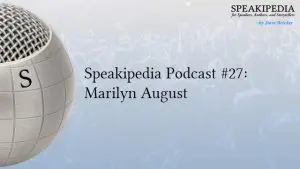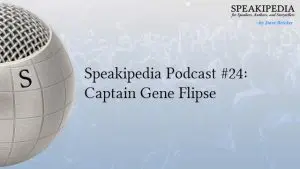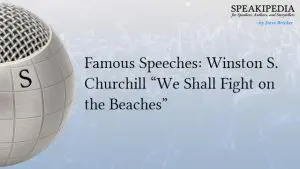Words and Terms related to speaking and speechwriting:
A form of hyperbole in which the exaggeration is so extreme as to be impossible
“You will sooner find a donkey flying than see me agree to that deal.”
A symbolic narrative in which the surface details imply a secondary meaning.
George Orwell’s “Animal Farm” as an allegory for the Russian Revolution.
The repetition of initial consonant sounds in nearby words.
“Peter Piper picked a peck of pickled peppers.”
The repetition of a word or phrase at the beginning of successive clauses.
“We shall fight on the beaches, we shall fight on the landing grounds, we shall fight in the fields.”
A short, amusing or interesting story about a real incident or person.
Using a personal anecdote to illustrate a point during a presentation.
The repetition of words in successive clauses, but in reversed order.
“Ask not what your country can do for you — ask what you can do for your country.”
A pithy observation that contains a general truth.
“Life is short, art long, opportunity fleeting, experience treacherous, judgment difficult.”
A figure of speech wherein a sentence is deliberately broken off and left unfinished.
“If you do that again, I’ll—”
Omission of conjunctions between words, phrases, or clauses.
“I came, I saw, I conquered.”
To speak at length in a pompous or boastful manner.
“The speaker bloviated about his achievements for over an hour.”
A harsh, discordant mixture of sounds.
“His speech was a cacophony of harsh sounds and angry voices.”
An arresting metaphor that pushes the boundaries of ordinary usage.
“I will speak daggers to her.”
Reversal of grammatical structures in successive phrases or clauses.
“Never let a Fool Kiss You or a Kiss Fool You.”
The use of many words where fewer would do.
Describing someone as “not unfamiliar with” instead of “familiar with.”
The point in a speech or story where the conflict or tension hits the highest point.
The climax of a mystery novel typically reveals the perpetrator.
The use of informal words or phrases in speaking or writing.
“Wanna grab a cuppa and gab for a bit?”
A speaker who seeks to manipulate or appeal to desires and prejudices rather than using rational argument.
“The leader used fiery speeches to fuel the crowd’s fears and secure their blind loyalty.”
A forceful and bitter verbal attack against someone or something.
“Her speech turned into a diatribe against the inequities in the system.”
The choice of words and style of expression.
The use of formal diction in academic writing.
The use of a harsh, more offensive word instead of one considered less harsh.
“Calling the old man a‘decrepit wreck’ instead of ‘senior citizen.'”
The art of clear and expressive speaking, especially of distinct pronunciation and articulation.
“He took elocution lessons to improve his public speaking skills.”
The repetition of a word at the end of successive clauses or sentences.
“See no evil, hear no evil, speak no evil.”
Emphatic repetition of a word, without any intervening words.
“Alone, alone, all, all alone, alone on a wide, wide sea.”
The characteristic spirit or ideal that informs a work or culture, often used in speech to establish credibility.
“Her ethos of transparency has won her the respect and trust of many.”
A mild or indirect word or expression substituted for one considered to be too harsh or blunt.
“He passed away” instead of “He died.”
The use of words that are pleasant to hear.
“Cellar door” is often cited as an example of euphony.
The beginning or introductory part of a speech.
“Ladies and gentlemen, thank you for gathering here on this auspicious occasion.”
To speak or perform without preparation; improvising.
“Caught off-guard, she had to extemporize a speech at the ceremony.”
A literary device used to give an advance hint of what is to come later in the story.
Ominous dialogue hinting at future events.
A lengthy and aggressive speech.
“The coach’s harangue at halftime was both fierce and motivating.”
The art of preaching or writing sermons.
“His skill in homiletics was evident in his ability to captivate his congregation with meaningful messages.”
An unusual order of words.
“Object there was none. Passion there was none.”
Exaggerated statements or claims not meant to be taken literally, used for effect.
“I’ve told you a million times!”
Done without being planned or rehearsed.
“His impromptu remarks captured the essence of the event better than any prepared speech.”
The use of words to convey a meaning that is the opposite of its literal meaning.
Saying “What a pleasant day” during a hurricane.
Placing two elements close together for contrasting effect.
“It was the best of times, it was the worst of times.”
A form of understatement using the negative to affirm the positive.
Saying “he’s not bad” to mean “he’s good.”
Appeal to logic, a way of persuading an audience through reason.
“If we look at the statistics, it’s clear that our approach is working.”
The mistaken use of a word in place of a similar-sounding one, often with unintentionally amusing effect.
“He’s the pineapple of politeness” instead of “pinnacle.”
A figure of speech in which a word or phrase is applied to an object or action to which it is not literally applicable.
“Time is a thief.”Certainly! Here’s the continuation of the updated list starting from “Metonymy”:
A figure of speech in which a thing or concept is referred to by the name of something closely associated with it.
“The White House declared” rather than “The President declared.”
An extended speech by one person.
“His monologue at the party was both hilarious and insightful.”
A common template of a broad category of tales that involve a hero who goes on an adventure.
The journey of Frodo in “The Lord of the Rings.”
a distinctive feature or dominant idea in an artistic or literary composition
“The mountain-climber’s keynote had an exploration motif.”
A literary technique in the opening of a story that hooks the reader’s attention.
Starting a novel with a mysterious dialogue.
A conclusion or statement that does not logically follow from the previous argument or statement.
“She loves Paris. She must enjoy waffles.”
Relating to the art or practice of public speaking
“Winston Churchill’s oratorical prowess was unmatched.”
Speech characterized as rich, clean, strong, and full.
“His orotund voice echoed through the hall, capturing everyone’s attention.”
A figure of speech in which apparently contradictory terms appear in conjunction.
“Deafening silence.”
The speed at which a story or speech unfolds.
Rapid pacing in an action scene.
A public speech or text in praise of someone or something.
“His retirement party featured a panegyric detailing his decades of service to the company.”
A statement or proposition that, despite sound reasoning from acceptable premises, leads to a conclusion that seems senseless.
“I must be cruel to be kind.”
Drawing attention to something by claiming not to mention it.
“Not to mention his previous failures, but his current success is impressive.”
Using similar-sounding words or phrases, often puns.
“To jaw-jaw is always better than to war-war”
Parody is a form of satire that imitates the style of a particular genre, work, or artist in a way that makes fun of those styles or works
‘The Simpsons’ has brilliantly parodied everything from political figures to entire genres of film, highlighting absurdities and bringing a lighter perspective to serious subjects.





